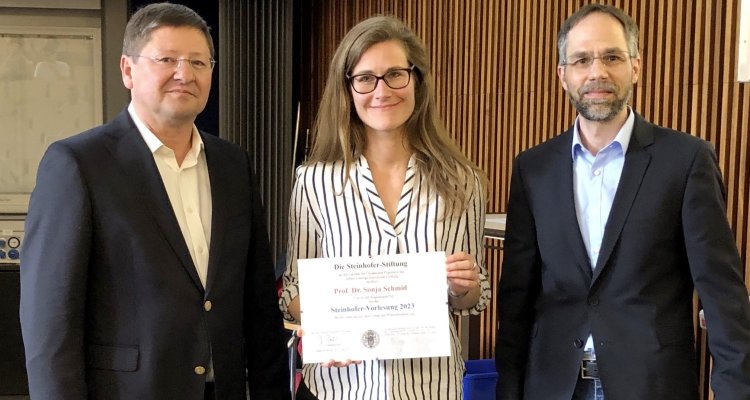Wageningen University & Research assistant professor wins Steinhofer Award for protein dynamics research
Sonja Schmid, an assistant professor in the biophysics chair group, received the Steinhofer Award on 15 May. The award recognises her remarkable contributions to the field of protein dynamics. As part of the prize, Schmid will receive a financial award of one thousand euros and an opportunity to present her work at the University of Freiburg.
Schmid’s research focuses on exploring the intricacies of biology at the nanometre scale. Her groundbreaking work has allowed for the measurement of the movement of individual proteins, which are the fundamental building blocks of life. “Proteins are not static entities; they constantly stretch, shrink, and vibrate,” explains Schmid. These dynamic movements are essential for their functionality. Schmid employed a unique technique to precisely measure the movement of proteins. “The method, known as FRET (Förster Resonance Energy Transfer), can be envisioned as a minuscule yardstick,” Schmid explains. Using this ‘molecular ruler,’ the biophysicist observes in real-time how an individual protein elongates or contracts.
Assisting protein
Schmid and her colleagues investigate a specific protein that plays a supportive role in the world of proteins. “We refer to it as a chaperone protein because it assists other proteins within the cell in adopting the correct shape, thereby enabling them to carry out their functions,” explains Schmid.
Additionally, Schmid’s team has achieved success in studying individual molecules using electricity. “Scientists have been utilising this so-called electrical nanopore recording to examine large molecules like long strands of DNA for some time, but capturing small molecules such as proteins using this method has proven challenging,” explains Schmid. To overcome this hurdle, the researcher has developed a ‘nanoscale vacuum cleaner’ that sucks a single protein into a well, allowing for its study. “The remarkable aspect of this method is that we can investigate the protein under conditions that mirror the temperature and other factors found in the biological environment,” adds Schmid.
From the nanoscale to broader perspectives
The Steinhofer Prize has been awarded annually since 1992 to exceptional researchers across all fields of chemistry. This year, Schmid received praise for her ability to combine a meticulous attention to detail with a broader perspective on biological matters. Schmid was taken aback by the win, saying, “I never expected this, because I am still at the early stages of my career. Hence, it is truly a great honour to receive this award.”

